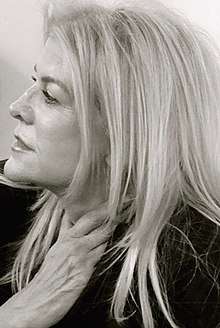J. Yellowlees Douglas
Jane Yellowlees Douglas (born J. Yellowlees Douglas; June 25, 1962) is a pioneer author and scholar of hypertext fiction. She began writing about hypermedia in the late 1980s, very early in the development of the medium. Her 1993 fiction I Have Said Nothing, was one of the first published works of hypertext fiction.
J. Yellowlees Douglas | |
|---|---|
 | |
| Born | June 25, 1962 |
| Alma mater | University of Michigan New York University |
| Scientific career | |
| Fields | Management Communication |
| Institutions | University of Florida |
Early life and education
Douglas was born June 25, 1962 in Detroit, Michigan. She did not have a first name apart from the initial 'J.' but found that it was misstated so often that she adopted "Jane' as her first name.[1][2][3]
She completed her undergraduate studies in English language and literature at the University of Michigan in 1982, where she went on to get an M.A in cinema and literary theory. She received her Ph.D. in English and education from New York University in 1992.[2][3][1]
Her Ph.D. dissertation, "Print pathways and interactive labyrinths: How hypertext narratives affect the act of reading," was supervised by Gordon M. Pradl. She spent a year as a research fellow at Brunel University in London examining the ways in which hypertext affects the construction of digital technologies.[2][3][1]
Career
In academia, Douglas has been the director of the program in professional writing and an assistant professor of English at Lehman College. She is presently Associate Professor of Management Communication in the Warrington College of Business Administration at the University of Florida.[2][3]
Douglas was a contestant on Jeopardy! on March 8, 2013.[2] In interviews and forum postings about this experience, Douglas revealed that her godmother is the actress Maggie Smith.[1]
Writings
Douglas has written over two dozen articles, short stories, and a book about the development, structure, and uses of hypertext. In a 1991 article—quite early in the development of hypertext as a new literary medium—she argued for hypertext as offering an alternative to an "either/or" view of reality in the form of an "and/and/and" structure.[4]
In her 2000 book, The End of Books or Books Without End, she examines how interactive fiction works and discusses the current state of hypertext criticism, arguing that hyptertext authors are the natural heirs of early 20th century experimental modernists like James Joyce.[3][5]
In "What Hypertexts Can Do That Print Narratives Cannot", Douglas goes into more detail about how hypertext fiction works as a literary form. Critics have noted acerbity as a characteristic of Douglas's writing as she "makes plain her frustration that hyperfiction works and their writers are still not considered part of the canon."[3]
Douglas is recognized for having discovered a node in Michael Joyce's hypertext novel Afternoon: a story that had no inbound links. In discussions about the novel, the node became known as "Jane's space" because she was the first to remark on its orphan status. She became implicated in revisions to this node, which originally (1987 edition) featured only a single phrase from Jung, "Man... never perceives anything", but later (1990 edition) included a second line: "and only Jane Yellowlees Douglas has read this line".[6]
Douglas's hypertext fiction I Have Said Nothing is book-ended by two car crashes and the resulting deaths. Douglas's goal was to use the fragmentations of hypertext to explore both causality and the enormous gulfs that separate people from one another. Designed in Storyspace, the work offers readers a variety of strategies for navigation: a cognitive map, links in the text, a default narrative line, and a navigation menu of available paths.[7]
Selected publications
- The Readers Brain. How Neuroscience can make you a Better Writer, Cambridge 2015.
- “The Pleasures of Immersion and Engagement: Schemas, Scripts, and the Fifth Business.” In First Person: New Media as Story, Performance, and Game. Noah Wardrip-Fruin and Pat Harrigan, eds. Cambridge, MA: MIT Press, 2004. (essay; with Andrew Hargadon)
- The End of Books or Books Without End. University of Michigan Press, 2000 (book)
- “The Three Paradoxes of Hypertext: How Theories of Textuality Shape Interface Design.” In The Emerging CyberCulture: Literacy, Paradigm, and Paradox. Stephanie B. Gibson and Ollie Oviedo, eds. Cresskill, NJ: Hampton Press, 2000. (essay)
- "I Have Said Nothing". Eastgate Quarterly Review of Hypertext, vol. 1, no. 2, 1993. Republished in Postmodern American Fiction: A Norton Anthology. Paula Geyh, Fred G. Lebron, and Andrew Levy, eds. New York: Norton, 1997. (short story)
- “'But When Do I Stop?'" Closure and Indeterminacy in Interactive Narratives.” In Hyper/Text/Theory, George Landow, ed. Baltimore: Johns Hopkins University Press, 1994:159–188. (essay)
- "The Act of Reading: the WOE Beginners' Guide to Dissection". Writing on the Edge, vol. 2, no. 2, 1991. (essay)
See also
References
- "Friday, March 8, 2013 Game Recap & Discussion, jboard.tv; accessed December 14, 2017.
- Mescon, Jenna (March 5, 2013). "UF professor to be 'Jeopardy!' contestant". University of Florida.
- Pullinger, Kate. "The End of Books 1" Archived July 6, 2013, at the Wayback Machine, trAce Online Writing Center, August 16, 2002.
- Joyce, Michael. "Notes Toward an Unwritten Non-Linear Electronic Text, "The Ends of Print Culture" (a work in progress)". Postmodern Culture 2.1 (1991); accessed December 14, 2017.
- "The End of Books by J. Yellowlees Douglas". Eastgate.com. Retrieved March 8, 2014.
- Kirschenbaum, Matthew G. Mechanisms: New Media and the Forensic Imagination, MIT Press, 2012.
- Yellowlees Douglas, Jane. "Are We Reading Yet? A few suggestions for navigation". I Have Said Nothing. Norton. Retrieved October 23, 2017.